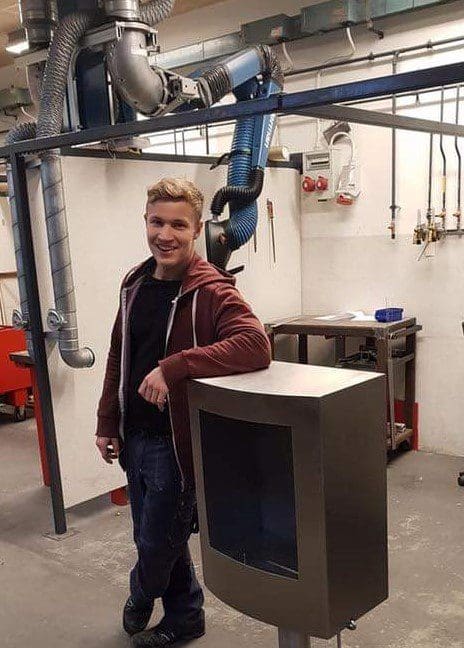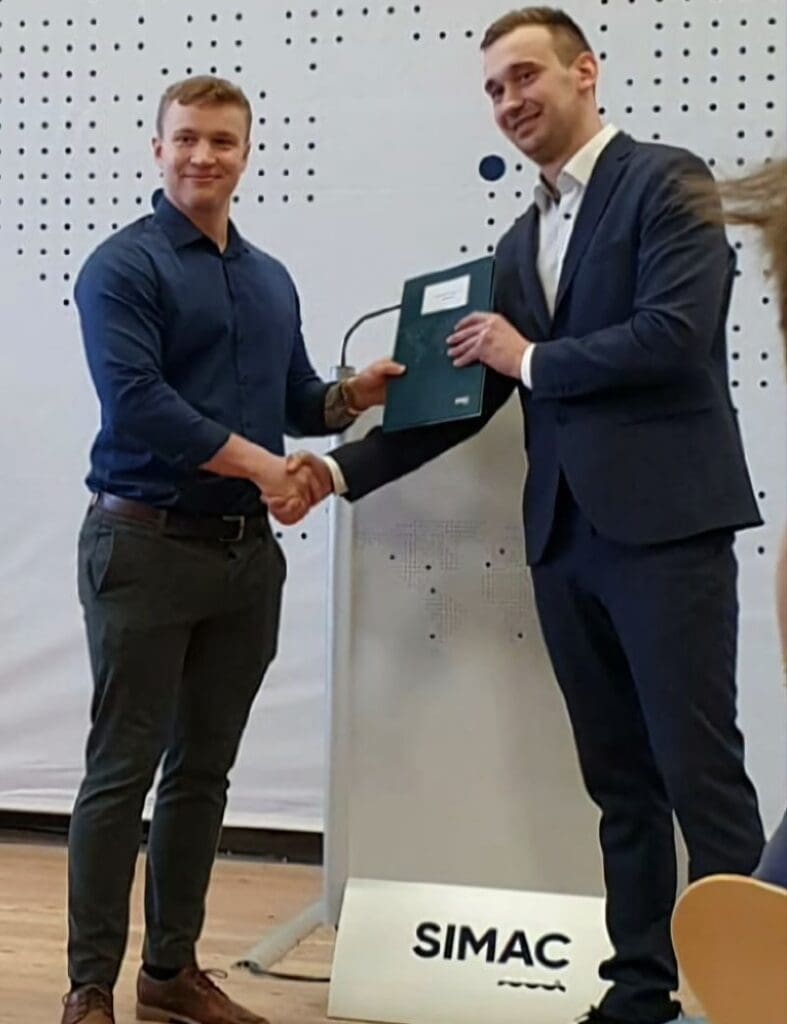Field Service Engineer for Miltenyi Biotec
Johannes Rosenkranz Field Service Engineer for Miltenyi Biotec in Denmark
Johannes Rosenkranz graduated in Technology Management and Marine Engineering from SIMAC – Svendborg International Maritime Academy. He has experience as an Engine Cadet and is now working as a Field Service Engineer for Miltenyi Biotec. Johannes is based in Denmark.


Background and path to engineering
Have you always been interested in the way things work?
I have always been curious as to how things worked on a deeper level, especially concerning new technology and “gadgets”. Even as a child, my favourite thing to do was to dismantle what I could and take a look at what was inside.
Were you inspired by any toys as a child?
Being Danish, LEGO was obviously a really big part of my life, as well as many other toys. I spent a lot of time with my PC too, which is where I think my technological interest started.
Why did you decide to go to Technical School and train as a metal worker?
I started off with something called a “Higher Technical Exam”, which is basically college but with higher demands from what I recall. Although the subjects were interesting, I just couldn’t find meaning in what I was learning. Through an internship programme we had at school, I figured out that I really enjoy working in a practical field. Then metal working/smithing turned out to be what interested me the most.
Apprenticeship
How much time did you spend as an apprentice and how much studying?
I didn’t spend much time as a smith/metalworker. I finished my trade exam which is basically about 3-4 years including practical experience, and then had a couple of months of work as a trained smith/metalworker. Immediately after this, I moved away and started studying for my bachelor’s degree. My plan had always been to leave shortly after I finished my trade degree, and my mentor and boss knew. They fully supported me all the way.
Why do you think an apprenticeship is a good way of starting a career in engineering?
In my opinion, it really depends on what line of work you’re in. Engineering is such a broad field of work and can be anything from electrical engineering to leading a project or building a biogas production plant. Apprenticeships are good ways of finding out if you even like the field of work to begin with. Then also a way to learn a lot in that specific field, before you start getting the workload and pay as someone who’s ready to take on all that responsibility.
In regard to metal working, an apprenticeship in Denmark is mandatory. You cannot finish your education without practical experience. Whether this turns out to be at a company, or with the school doesn’t matter. If you don’t find a company to work out your apprenticeship periods, you need to undergo a school apprenticeship.
Advantages of an apprenticeship
What are the advantages of an apprenticeship over full time study?
Where I’m from, apprenticeships/practical experience and full-time studies usually go hand in hand. Professional bachelor’s degrees as they are called in Denmark, are bachelor’s degrees focused on practical field work and always include mandatory work experience before you can graduate.
Education such as “Metal work” or “smithing” is what we call an “erhvervsuddannelse” or “vocational education” and also include mandatory work experience. There is still the option of being educated as a full-time apprentice, called “Mesterlære”.
In your opinion, why is it better to learn theory and practice together?
I think it’s a good system, that ensures that the people in these practical fields of work, actually learn from someone with experience, and therefore all the different ways of completing your work. A lot can go wrong with practical field work, especially if you go straight from books and theoretical knowledge, to working on construction and safety.


Technology Management and Marine Engineering
You have moved from metal work to marine engineering? How difficult was the transition?
With the conditions as they are in Denmark, the transition was as easy as applying for the Maritime Academy in Svendborg. My mentor and boss at my old job were supportive from the beginning. This is because they always knew my plans to further educate myself after I finished my trade degree. As soon as I finished my trade as a smith I handed in my 3 months’ notice, and moved away on the day I left my job. I recall that I had a month or two before the degree started, but it gave me some breathing room to recollect all my thoughts and bearings.
All in all, transitioning here is incredibly straightforward and easy.
Which skills did you take with you when you started your degree?
A lot of the machinery I was learning about on ships, were like the production machines I worked on as a smith, only bigger. For example:
pumps,
heat exchangers,
valves,
pipes,
separators,
tanks (containers).
All of this I had already worked with at my old job, and it gave me a good head start at least in the practical sense. Apart from knowledge about welding, safety, and metal construction, not much was taken with me theoretically to be used in the bachelor’s degree.
What did you learn from your time at sea?
Why would you personally suggest an apprenticeship programme to someone?
Practical experience is always a plus, so depending on the conditions I would always recommend getting an apprenticeship before getting your first job in the practical field.
Internship as an Engine Cadet
What did this internship involve?
The bachelor’s degree “Technology management and Marine Engineering” is incredibly broad in Denmark.
It is one of the very few countries in the world, where a degree in marine engineering is not necessarily focused on maritime/marine duties or work. The education still has its foundation in the maritime world, having mandatory subjects like ship construction, thermal machinery and other subjects primarily found on a ship.
But since these areas are also found in all other places of the world, the content becomes one of the most versatile degrees you can take in Denmark. With this degree I could have become a high voltage electrical engineer working on power plants. I could have become a manager as the degree includes various management courses. I could have become a sales engineer, as we undergo around two semesters studying business economics. Or I could have taken the classic route and become a marine engineer at sea.
I chose to choose the subjects of marine engineering as we know it, and therefore my internship needed to be approved by the maritime authority before I could get my degree.
Working on a ship
When I got to the ship, it was a surreal experience. Being flown to Scotland to board a ship already at sea with a helicopter was an experience I never thought I would get. On the ship, I was tested immensely by the experienced marine engineers. There were high demands on my level of knowledge, and they made sure that I knew that. I quickly learned about all the systems on board, but I must admit that I should have paid more attention to some of the stuff in school. This is because I felt that most of what I learnt in the beginning of my education, was completely lost.
I had many different jobs on that ship. Everything from just taking counters, to undergoing performance tests on the main engines (We had multiples on the diesel-electric ship propulsion system).
Experience offshore
One of the lessons I really took to heart, was to never give up, no matter how pointless or useless it seems. There were many situations where I was put in the middle of the chaos expecting to know a lot that I didn’t, primarily my own fault. Because I had forgotten much of what I learnt at the start of my degree, I sat in my cabin for many hours after my shift reading my old notes and books. I went from being completely clueless, to actually being quite a competent worker with a good amount of knowledge behind me in the matter of a month or so. Be patient and true to yourself.


Move to field engineering
A Field Service Engineer needs to have a range of skills. How do you think your experience provided this?
I don’t think my experience brought that much to the field I work in now, and that’s not necessarily a bad thing. Working in the biomed field as an engineer, is so different from what I have done in the past. I never knew what flow cytometry was, or how the machines the scientists use actually work. Some of the equipment I work on is rather simple, utilising pumps, valves, and fluid dynamics. This is something I’ve learned all about from my degree and past work. Most of the insides in these machines are just the parts I usually worked with, but smaller.
Some of the other machines however are completely new to me. They include lasers, cameras, PMTs (photomultiplier tubes), fluidic control boards and all other kinds of stuff. I think my past jobs have given me a very good foundation to work with, but now I need to focus my skills on the field I find interesting.
What attracted you to the biomedical industry?
It makes sense to me. The biomedical industry has always been very important to me, more so than other fields. If what I work in, helps develop medicine to cure people, or helps to actually treat people then I feel motivated to go to work every single day.
Field engineer skills
Apart from a strong technical background, what are the three most important skills for a field service engineer to have?
In my opinion, a field service engineer should be able to:
problem solve and be analytical,
optimize a process,
and be able to communicate properly with colleagues and customers.
What sort of personality traits are ideal for a field service engineer to be successful?
Even though field service can be a lonely job, traveling alone and working alone, one of the most important traits I think one needs, is to be socially approachable. You need to be confident and welcoming to the customers you meet.
This is because you are the face of whatever issue or planned maintenance you’re there to undergo with their equipment. If you enter their facility and start working on their equipment while seeming incredibly unsure of what you’re doing, people can get nervous. The customer needs to be able to trust you and the process, and that can only happen if you’re confident in what you do, and if you actually seem open and approachable. From the very short time I’ve had in the field, I can already say that from what I have experienced, the customers are usually as approachable as you are.
Typical week
Can you describe the type of equipment you support?
I work on relatively simple machines most of the time. I maintain equipment that separates cells, and I work on machines that analyse cells. The process is fairly simple, but it’s challenging work, nonetheless.
What’s your typical week like?
As of right now, my workload isn’t what I expected it to be. My first two months were purely training, but now that I have full control over my own planning, I don’t have a typical week anymore. I can have days without work, or I can have a week which is fully booked. It all depends on that month’s workload, and how I plan it. If I want to, I can contact the customers and plan the PMs (Preventative Maintenance, Performance Checks, and Electrical Safety) together and strategically to fit my traveling routes. That way I can work it like a paper round. I won’t have to travel back and forth, and I can get a month of work done in maybe less than a week.
Customers and support
How much of your time is spent ‘hands on’ with customers and how much on administration, training, and other aspects of your role?
A lot of the work time is spent on administrative duties. We have a lot of communication responsibility with the customers (follow ups and planning etc.). In addition, we have a lot of service reports to fill out. It all varies from week to week, but I would say that administration make up about 60% of the workload, maybe a bit less.
Which other people in the workplace give you support?
Apart from technical support, which is always available, I have my colleagues. I’m stationed in the Nordics department, and my colleagues here from Sweden are always incredibly helpful and pretty much available at any time. Other than that, I can always contact my supervisor to lean on if I need it.
Travel
How much travel do you do?
It depends on a lot of things. I don’t do as much travel as I feared to begin with, but it has both its benefits and downsides.
Working in the Nordics means that I get to travel outside of Denmark. I could get to go to Stockholm, Oslo, Faroe Islands, Lithuania, Estonia, Finland or honestly any other place in the Nordics. I’m not just stationed in Denmark but have all the Nordics to be able to travel to. As I mentioned before, my workload usually depends on my level of planning.
If I have a job in Sweden and Copenhagen all within driving distance, I will plan the jobs next to each other. So then, I could drive to Sweden, stay at a hotel, and then go through to Copenhagen the next day to finish that job. If I had more in Copenhagen I could spend another night, and do that the next day, or even the same day if I’m feeling optimistic.
Most challenging part of the job
What is the most challenging part of your job – technical side, logistics, or customers?
Logistics have definitely been a big challenge, but that’s mostly due to planning and technical issues. Getting the right parts and tools in time can prove to be difficult sometimes, but mostly it works out anyway!
So far, the customers have been nothing short of amazing. They are all incredibly friendly and welcoming, and it really shines on the work I end up doing. The technical side is usually pretty straightforward, but I also haven’t really done any field corrective work, or acute breakdowns yet. Planned maintenance usually works out as expected, but sometimes you have some misaligned laser mirrors, or a machine that just stops working as soon as you arrive at the site.
What has been your most challenging job to date?
I’ve only just recently taken on solo jobs, so I don’t have that many jobs to talk about yet. I recently finished a job on a machine that had issues with a valve drive. In the process of fixing that drive, I accidentally broke another drive. That meant I had to wait days before I could get another drive, since the spare part was brand new in the system at the time.
Troubleshooting
How do you explain technical issues to non-technical people?
I always try to use daily analogies to visualise the issues for someone who might not be very technical. Usually, the customers are busy and don’t bother with the equipment once I get to work on it. However, sometimes you meet those that are actually interested in what you’re doing. This isn’t born from mistrust, but curiosity. What I do is just try my best to simplify it and use analogies for daily situations as much as I can.
What do you do when something is not working, and there is no obvious reason?
If I have already been troubleshooting to the best of my abilities, I call up my colleagues and ask them. Usually, they know what to do even if the issue can’t be fixed immediately.
Further reading
Another Miltenyi Biotec engineer:
John Missihoun Field Service Engineer and YouTuber.
Further discussion on apprenticeships:


What a great story. Thank you for sharing it. I always find it fascinating all the different places and experiences biomeds have. Stay safe in your travels and God bless you.